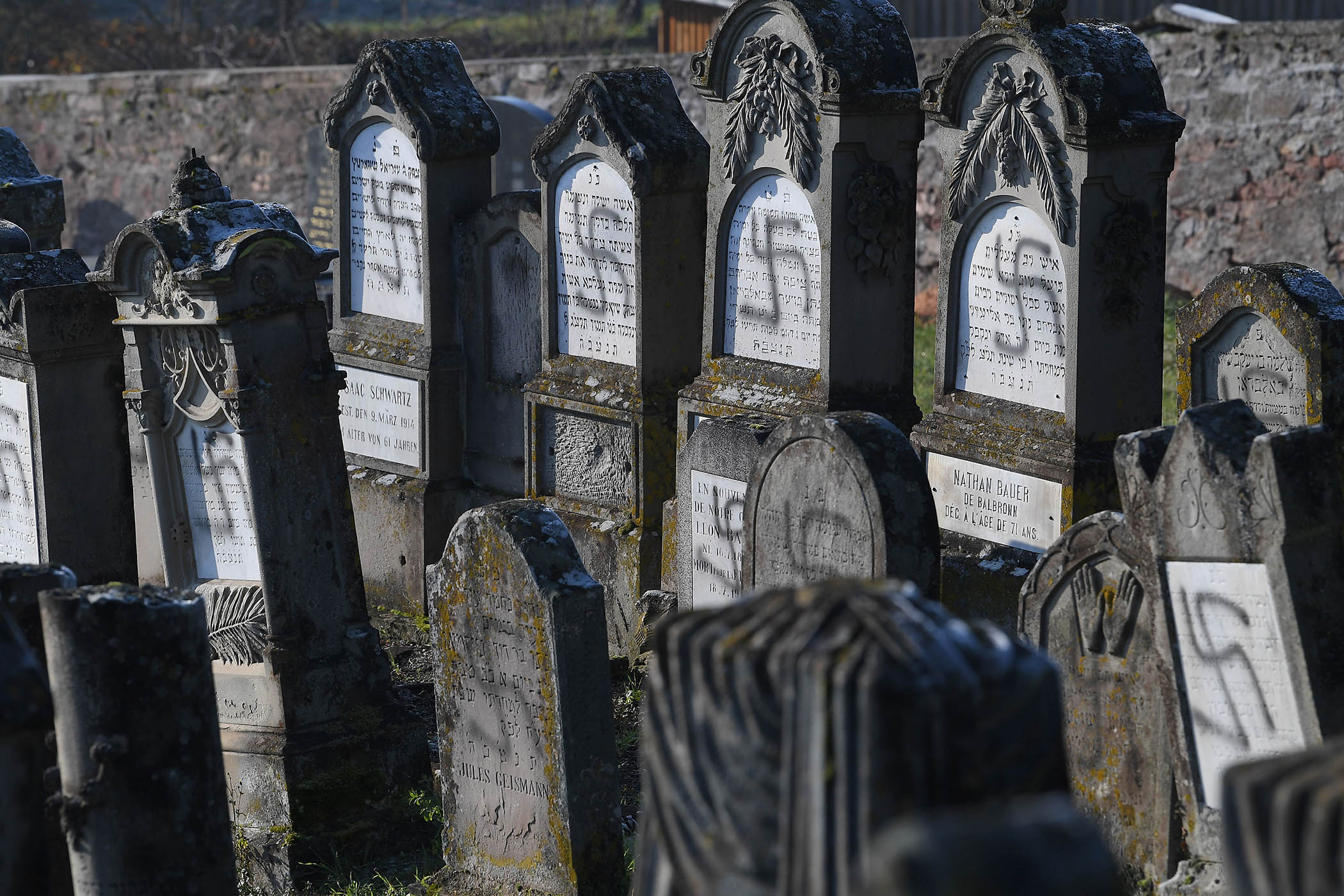The film-maker Billy Wilder is credited with the line: “The optimists died in the gas chambers, the pessimists have pools in Beverly Hills.” I thought of Wilder when I read this sentence in Mark Mazower’s On Antisemitism: A Word in History: “Historians of antisemitism tend to be catastrophists by inclination, and they rarely dwell on the times when the phenomenon subsides.” Mazower, a historian at Columbia University and a Jew, is an optimist – everything is relative here – and On Antisemitism seeks to answer a pressing question: where does antisemitism meet anti-Zionism? There is, he writes, “general uncertainty over what one may say about Israel without being accused of antisemitism”. His subject, then, is: what may one say?
This is not a history of antisemitism, a prejudice that long pre-dates the word itself and finds contemporary expression in speech, action and – as in this week’s deadly attack on a Manchester synagogue – violence. Mazower flies over the long bloody history of European antisemitism – Jews as devils, surely relevant? – and opens in the 19th century, when the phrase was coined by the antisemitic German journalist Wilhelm Marr. It marked how medieval Jew hate, which was based on religion (converts to Christianity were absolved) changed into the race-based antisemitism of Nazism. (Marr had a Jewish wife. He probably had a Jewish friend.) The first part of On Antisemitism looks “at the rise and fall of antisemitism as a chiefly European political movement”. The second part analyses “the origins and spread of a new conceptual paradigm that originated in the 1970s largely as a way to rationalise growing criticism of Israel”.
The first part is uncontroversial: Mazower relates how antisemitism survived the Holocaust. There were pogroms in Poland in 1946; an “anti-Zionist” campaign in Soviet Russia towards the end of Stalin’s rule, triggered by Golda Meir’s reception in Moscow in 1948; a mass exodus of surviving Polish Jews in 1968; the infamous “international Swastika outbreak” of 1959-60, in which the KGB tried to destabilise the US’s alliance with West Germany. Soviet Russia finessed a “new” antisemitism and surviving Nazis moved to the Middle East, carrying their dogma to freshly fertile lands.
In the second part, Mazower sets himself against the Jerusalem School of historians, who named antisemitism “an eternal cosmic drama in which ‘neither Jew nor antisemite changes, only the mask the antisemite wears’”. The Jerusalem School believes that antisemitism lives in the subconscious, a hard thing to prove or disprove, though I believe it: the Jews were hated because we killed a god. Mazower quotes Yehuda Bauer, perhaps the greatest Holocaust historian, on the inadequacy of the word (but nothing of Bauer’s views on antisemitism). Bauer called antisemitism “the wrong term” that “makes a mess of research projects” and involves “talking nonsense”. Mazower also quotes Lewis Carroll’s Alice in Through the Looking-Glass: “That’s a great deal to make one word mean.” This is an acknowledgment of the fantastical territory the debate over antisemitism occupies: we process the Holocaust not only in Europe, where it happened, but in lands where it didn’t.
Mazower reads sometimes like a lawyer, at others like a liberal locked in an archive
Mazower reads sometimes like a lawyer, at others like a liberal locked in an archive
Mazower assembles the case for rational disgust with Israel. Arabs did not hate Jews until they lived in the Middle East in large numbers, he notes; previously, he writes, Jews, “enjoyed a substantial degree of communal autonomy and suffered nothing comparable to the historical scale of Christian anti-Jewish persecution”. (Again, everything is relative here. The Mufti of Jerusalem, its chief Muslim cleric, longed to see the Final Solution reach the Middle East; his cousin was Yasser Arafat.) Israel sought to speak for all Jews, often against diaspora instincts. The passages on American Jewry’s growing fear of antisemitism, which Mazower thinks is often incited by Zionist elements, are fascinating. These are Billy Wilder’s pessimists, and their anti-Zionist grandchildren are growing to despise them.
The pessimists have material: in 1975, the UN General Assembly passed the resolution equating Zionism and racism, and the Jews of north Africa and the Middle East came “to be seen both as stand-ins for European imperialism and as closet Zionists”. Mazower caveats everything: he reads sometimes like a lawyer, at others like a liberal locked in an archive. I don’t think he gives the Jewish exodus from Arab lands to Israel the emphasis it deserves – 900,000 fled for Israel after 1948 – though the Nakba (displacement of the Palestinian people) gets its due from him, as it should. He notes the swing to the right in Israel, and Benjamin Netanyahu’s ease with tyrants elsewhere; Mazower does not trust the hate-crime figures that antisemitism campaigners release, another reminder that this is fantastical terrain.
I trust Mazower’s facts, but not his conclusions. He describes elements of pre-Holocaust antisemitism: universities, for instance. Scholarly “publications gave credence to the idea that Jews were a cohesive group fundamentally alien to the societies around them”. Or: “The forces of modernity [in Russia] – the railways… and the sensation seeking press (still a novelty in a largely illiterate society) – created a combustible mixture in a world where the old blood libel was still widely believed”. Or after the 1878 Congress of Berlin: “To antisemites, the signs of Jewish influence upon European diplomacy confirmed their nightmares: It seemed to them that prominent Jews [were] using their legendary wealth to bend nations to their will.” The universities were crucibles of hatred: then, but not now? Jewish internationalism was considered a threat to respectable nation states: then, but not now? Modernity was itself a threat to Jews: then, but not now?
Although he admits that “anti-Zionism turned into a kind of litmus test of progressivism that pushed away Jewish leftists sympathetic to Israel”, he is likewise credulous on Jeremy Corbyn. He describes Corbyn writing an updated introduction to John Hobson’s Imperialism: A Study. Corbyn ignored Hobson’s antisemitic slurs (“men of a singular and peculiar race”) yet Mazower deals with no other accusation, merely writing: “Corbyn was no antisemite.” Wherever you land, to dismiss the charges against Corbyn in a sentence will not do. At times like this, On Antisemitism reads less like a fair survey of threats from right and left (all extremism meets itself in the end) than a defence of the left, a how-to guide for respectable activists.
He opens his section on modern American campuses with a passage noting: “The siren call of the blonde shiksa [gentile girl] haunted the nightmares of Jewish mothers.” Why make a speculative description of Jewish racism from the mid-20th century here? Mazower laments that today’s “online blacklists, doxing trucks, and vitriolic social media shaming campaigns spray accusations of antisemitism”. He does not say what prompts them.
That is not to say that the right does not exploit antisemitism. I watched lines of baffled Tories queue for Conservative Friends of Israel at party conferences in the years of Corbyn’s leadership, certain that they were on the Jewish “side” because Labour, then, were not. Trump and his gruesome allies wound civil liberties in the name of Jewish safety, and Jews will not be safer for it: this is repulsive cynicism, and I sense that Jews, in the end, will be blamed. Some say everything is antisemitism. Some say nothing is. Both are wrong. This subject should never have been folded into the culture wars and its hypocrisies, but it has.
Newsletters
Choose the newsletters you want to receive
View more
For information about how The Observer protects your data, read our Privacy Policy

In 2019, over 100 Jewish graves were desecrated in the Westhoffen cemetery, near Strasbourg in France. AFP/Getty Images
For Mazower, who strives for fairness, anti-Zionism “can mean quite different things to different people”. This is surely true. It may be based “upon a principled dislike of ethnonationalism of all kinds – whether Jewish or non-Jewish”, a “radical disapproval of the outcome of 1948 or maybe a desire for a polity with equal rights for all on either side of the pre-1967 borders”. And “some may indeed dream of a state without Jews at all”.
He concludes that “anti-Zionism carries the risk of its own form of intolerance and prejudice … But that is a very different matter from saying it is equivalent to antisemitism, which clearly it is not.” That depends on what anti-Zionism means – moderation of Israel, or annihilation – but he doesn’t interview enough anti-Zionists, or indeed Zionists, to illuminate either. For me, anti-Zionism is sometimes antisemitism and sometimes not: it depends on what your plans are for Israeli Jews when Palestine is free. Mazower quotes the historian David Myers, who “sees anti-Zionists as making a crucial contribution to a ‘debate over issues of key import to the Jewish future,’ namely the basic character of Israel”. I laughed at this idiocy: I have seen people on “pro” Palestine marches making triangle signs with their fingers at Jewish anti-protesters to designate them targets while the respectable element says nothing, though they should.
Mazower ends with a story about Haim Cohn, a former Israeli attorney general, attending an antisemitism conference in 1985. “One after another, the speakers … warned of the threat posed by antisemitism, its mysterious expansion around the world, and the need to understand it in all its manifold incarnations.” But “the only dissenting note was struck by Cohn”, whose conclusion was: “For Jews in Israel there is only one way to combat anti-Semitism. That is not to imitate.” This is a rebuke, a prayer even, and it is futile: this conflict will not be resolved by Jewish shame. Everyone brings trauma to this subject, because the Holocaust has barely been dealt with by Jew or non-Jew. Mazower, a descendant of anti-Zionist Bundists, is engaged in his own negotiation with it. No doubt so am I.
The unanswerable question remains: do people hate Jews because of Israel? Or do people hate Israel because of Jews? To me, the history of antisemitism suggests the latter, though Mazower might say I am infected by the Jerusalem School’s pessimism, while others will call me deaf to Palestinian anguish. Mazower merely notes: “All we can say is that contention over antisemitism is unlikely to end soon.” It is, consciously or not, a statement of his failure. In the fantastical, shifting terrain of Jewish history, how could it be otherwise?
On Antisemitism: A Word in History by Mark Mazower is published by Allen Lane (£25). Order a copy from The Observer Shop for £22.50. Delivery charges may apply
Editor’s note: our recommendations are chosen independently by our journalists. The Observer may earn a small commission if a reader clicks a link and purchases a recommended product. This revenue helps support Observer journalism
Main photograph depicts Jewish people marking the formation of Israel’s new constituent assembly in February 1949, courtesy of Bettmann Archive

